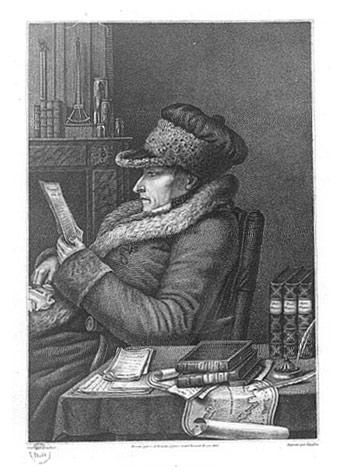Francois Peron
Francois Peron was born in France in 1775 and while travelling as a naturalist on Baudin’s expedition was among the parties exploring Shark Bay in 1801. In doing so he made some of the earliest recordings of Shark Bay’s wildlife and first people. It is in his honour that Francois Peron National Park is named.
The eldest son of a poor village family, he contracted smallpox when four years old and this left him blind in one eye. After studying in a monastery he became a soldier in the Napoleonic wars and was severely wounded and taken prisoner.
In 1800 Peron achieved a position as pupil zoologist on the Baudin expedition. They first arrived in Shark Bay in July 1801 and undertook extensive surveys involving collection of many specimens.
During the return voyage in 1803, the Geographe anchored offshore from Cape Lesueur on 19 March. On hearing reports of Aborigines on the mainland Peron organized a walking expedition across the peninsula from west to east. He was accompanied by Petit, an artist, and Guichenault, a gardener. They attempted to communicate with some Aborigines near Herald Bight, but the Aborigines fled.
Peron’s focus on scientific exploration throughout the three year expedition “impelled by my zeal, and the pleasure I had in the important discoveries I was making” often led him to disregard Baudin’s orders and contributed to ongoing friction between the two men during the expedition. Peron was also in the habit of getting lost and returning dehydrated and exhausted while exploring.
These habits were a constant source of irritation to Baudin and he wrote in his journal after the peninsula crossing: “This is the third escapade of this nature that our learned naturalist has been on, but it will be his last, for he shall not go ashore again unless I myself am in the same boat.”
Peron was the leading scientist on the expedition when the Geographe returned to France in 1804. Of the 23 scientists who began the expedition, only three returned. Peron was the only zoologist to complete the trip and to him fell the task of writing the zoological results. His work was illustrated by Charles Lesueur who had joined the expedition as a gunner.
Many of the 100,000 animal specimens taken to France on the Geographe had been collected in Shark Bay and Peron’s writing established him as the father of anthropology. The specimens represented almost 4,000 species – one of the greatest achievements in scientific history. Of these, more than 2,500 were new to science. While he became famous amongst scientists in France, he was not recognized elsewhere.
Péron died of tuberculosis in 1810, six years after returning to France. Many of the expedition’s manuscripts were finished by Louis de Freycinet.

